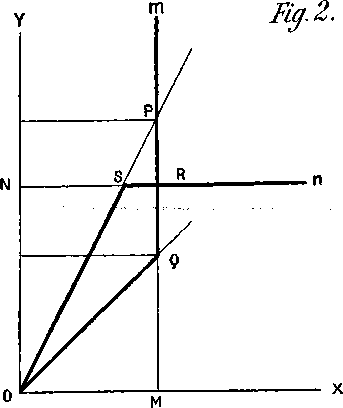THEOBY OF INTERNATIONAL VALUES
611
■elsewhere (Political Economy, Book III. ch. 2, § 3, and review
of Thornton, Dissertations, iv.) so well applied to the phenomenon
of Supply and Demand. However, suppose that the intersections,
of the curves are very frequent and' close together (as may well
be when both are inelastic : ante, p. 430, fig. 4, diagram 4), the
case supposed by Mill virtually, if not theoretically, comes into
■existence. It should be added that Mill has done nothing in
his later sections to remove that sort of indeterminateness which
does occur in the actual case of plural, though definite, positions
of equilibrium—not to speak of that sort of indeterminateness
ISngland is as before O Q, Qm. These curves intersecting at B, ‘the international
values will thus be 100 cloth for 160 linen.’
A (3). In the next case it is supposed that ‘ the million yards of cloth which

ILngland can make will not satisfy the whole of Germany’s pre-existing demand ; that
■demand being (let us suppose) for 1,200,000 yards ’ (the case put in the note to sec.
7, and by reference to that section included under the first head, our A). This case
is represented by Fig. 3, where O N is twice 1,200,000, and accordingly the German
demand-curve is O S, S n ; while the English demand-curve is as before OQ, Qm.
Accordingly the point of intersection being at Q, Germany will purchase a million
yards of cloth from England for two million of linen, and will lay out the remainder
of the cost, which by hypothesis is constant, in producing for herself 300,000 yards
of cloth.
It may be asked, might not Germany, as she gains no advantage by purchasing
the million yards of cloth, prefer to produce them herself. The answer to this
question, which might equally be asked with respect to case 1, is that O, the position
of null trade, is not a point of stable equilibrium. Suppose for the moment that
all the.1,200,000 yards of cloth were produced in Germany while the linen consumed
in England was. produced there. It would be for the interest of some of the pro-
More intriguing information
1. The resources and strategies that 10-11 year old boys use to construct masculinities in the school setting2. The name is absent
3. The role of statin drugs in combating cardiovascular diseases
4. The name is absent
5. Elicited bid functions in (a)symmetric first-price auctions
6. The name is absent
7. Impacts of Tourism and Fiscal Expenditure on Remote Islands in Japan: A Panel Data Analysis
8. The quick and the dead: when reaction beats intention
9. LOCAL CONTROL AND IMPROVEMENT OF COMMUNITY SERVICE
10. Ongoing Emergence: A Core Concept in Epigenetic Robotics